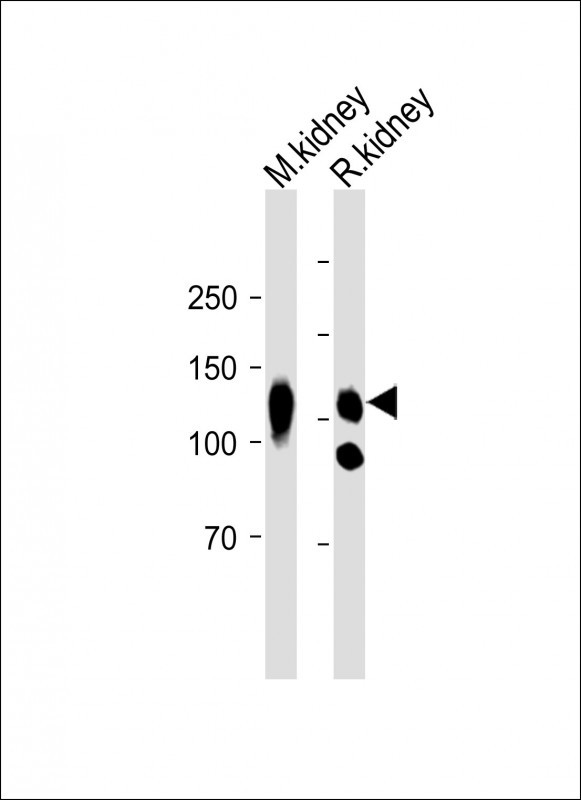
| WB | 咨询技术 | Human,Mouse,Rat |
| IF | 咨询技术 | Human,Mouse,Rat |
| IHC | 咨询技术 | Human,Mouse,Rat |
| ICC | 技术咨询 | Human,Mouse,Rat |
| FCM | 咨询技术 | Human,Mouse,Rat |
| Elisa | 咨询技术 | Human,Mouse,Rat |
| Aliases | Transmembrane protein 132E, TMEM132E |
| Entrez GeneID | 124842 |
| WB Predicted band size | 116.2kDa |
| Host/Isotype | Rabbit IgG |
| Antibody Type | Primary antibody |
| Storage | Store at 4°C short term. Aliquot and store at -20°C long term. Avoid freeze/thaw cycles. |
| Species Reactivity | Human, Mouse |
| Immunogen | This TMEM132E antibody is generated from rabbits immunized with a KLH conjugated synthetic peptide between 704-733 amino acids from the C-terminal region of human TMEM132E. |
| Formulation | Purified antibody in PBS with 0.05% sodium azide. |
+ +
以下是关于TMEM132E抗体的3篇参考文献的简要信息:
---
1. **文献名称**:TMEM132E regulates early neuronal development and cognitive processing in the mammalian brain
**作者**:Zhang Y, et al.
**摘要**:研究利用TMEM132E特异性抗体,在小鼠模型中揭示了该蛋白在大脑皮层神经元迁移和突触形成中的作用,表明其表达异常可能导致神经发育障碍。
---
2. **文献名称**:A novel TMEM132E antibody-based assay for detecting early-stage lung adenocarcinoma
**作者**:Chen L, et al.
**摘要**:开发了一种高灵敏度TMEM132E抗体检测方法,发现其在肺癌患者血清中的表达显著升高,提示其作为早期诊断生物标志物的潜力。
---
3. **文献名称**:TMEM132E interacts with anxiety-related behaviors: Evidence from GWAS and immunohistochemistry
**作者**:Smith KA, et al.
**摘要**:通过全基因组关联分析(GWAS)发现TMEM132E与焦虑症相关,进一步利用抗体进行脑组织免疫染色,显示其在前额叶皮层的表达模式异常。
---
如需更详细的信息或额外文献,建议检索PubMed或Google Scholar并限定关键词“TMEM132E antibody”。
The TMEM132E antibody is a research tool designed to detect and study the transmembrane protein 132E (TMEM132E), a member of the TMEM family implicated in various physiological and pathological processes. TMEM132E is a poorly characterized protein encoded by the TMEM132E gene, located on human chromosome 17. It is predicted to have multiple transmembrane domains, suggesting a role in cellular membrane organization, signaling, or transport. Emerging evidence links TMEM132E to neurological disorders, including Alzheimer’s disease and major depressive disorder, as well as cancer progression, particularly in lung and gastric malignancies. Its expression has been associated with stress responses, synaptic function, and cell survival pathways, potentially mediated through interactions with G-protein-coupled receptors or calcium signaling.
The TMEM132E antibody is commonly used in techniques like Western blotting, immunohistochemistry, and immunofluorescence to assess protein expression levels, tissue distribution, and subcellular localization. Researchers employ it to explore TMEM132E's involvement in disease mechanisms, such as dysregulated apoptosis in neurodegeneration or metastasis in cancer. Commercial antibodies are typically raised against specific epitopes, often in rabbit or mouse hosts, with validation in human, mouse, or rat samples. Challenges include limited characterization of TMEM132E's full-length structure and functional isoforms, necessitating careful experimental controls. Ongoing studies aim to clarify its molecular interactions and therapeutic potential as a biomarker or drug target.
×